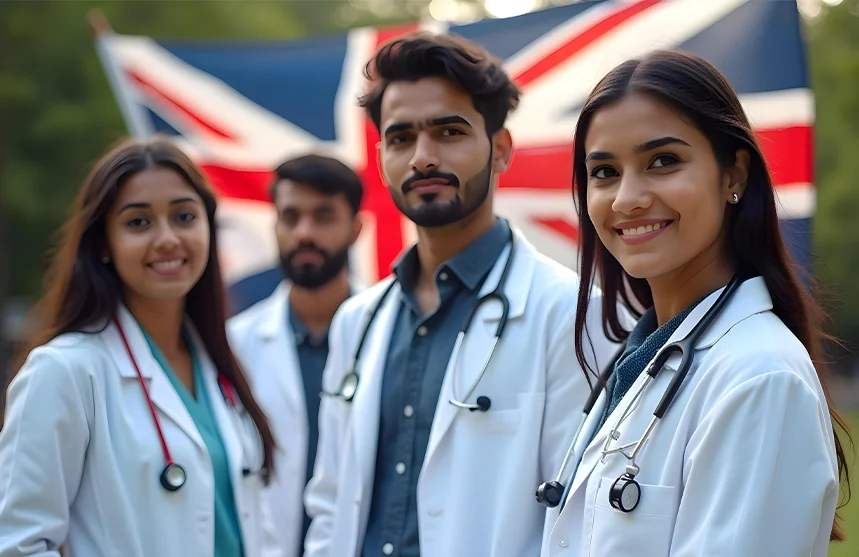
Is It Worth Studying MBBS in China
- 11th October
- 35

Before diving into the application process, it is crucial to demonstrate proficiency in English. The General Medical Council (GMC) mandates that international medical graduates (IMGs) provide proof of their English language skills. The two primary tests accepted are:
These tests ensure that you can communicate effectively in a clinical setting, which is vital for patient care and collaboration with colleagues.
Once you have established your English proficiency, the next step involves passing the necessary examinations. The two primary routes for international medical graduates are:
PLAB (Professional and Linguistic Assessments Board): This exam assesses your medical knowledge and clinical skills. It consists of two parts:
UKMLA (UK Medical Licensing Assessment): This is an upcoming assessment that will replace PLAB, designed to ensure that all doctors practicing in the UK meet the same standards.
After successfully passing the required exams, the next step is to register with the GMC. This registration is essential for obtaining a license to practice medicine in the UK. The GMC registration process involves submitting your exam results, proof of English proficiency, and a Certificate of Good Standing from your home country’s medical council.
The UK offers a variety of postgraduate medical qualifications that cater to different career aspirations. Some of the most sought-after options include:
The choice of specialization can significantly impact your career trajectory. Some popular postgraduate specializations for Indian doctors include:
Selecting the right university is a critical step in your postgraduate journey. The UK is home to several prestigious institutions known for their medical programs. Some of the top universities include:
| University | QS Ranking (Medicine 2025) | THE Ranking (Medical & Health 2025) | Tuition Fees (Approx. per year) | Popular Courses |
|---|---|---|---|---|
| University of Oxford | 2 | 1 | £35K – £52K | MSc in Global Health Science |
| Imperial College London | 7 | 4 | £39K – £42K | Master of Public Health |
| University College London | 8 | 8 | £35K – £40K | MSc in Health Data Science |
| King’s College London | 15 | 12 | £34K – £38K | MSc in Clinical Pharmacology |
When applying for postgraduate programs, you will typically need to provide:
It is essential to be aware of application deadlines, which can vary by university and program. Generally, applications for postgraduate courses in the UK open in the autumn, with deadlines ranging from December to March for courses starting in the following academic year.
Studying in the UK can be a significant financial investment. Tuition fees for postgraduate medical programs typically range from £20,000 to £52,000 per year, depending on the institution and course. Additionally, living expenses can vary widely based on location, with an estimated monthly budget of £800 to £1,200 for accommodation, food, and transportation.
Several funding options are available for international students, including:
After obtaining GMC registration, you can apply for clinical positions within the National Health Service (NHS). Most international medical graduates start in non-training roles, which provide valuable experience and help you acclimate to the UK healthcare system. Positions such as Clinical Fellow or Trust Grade Doctor are common entry points.
Once you have gained sufficient experience, you can apply for specialty training programs through a competitive process. This training is structured and leads to a Certificate of Completion of Training (CCT), which is essential for becoming a consultant in the NHS.
The work culture in the NHS is characterized by teamwork and a patient-centered approach. Unlike the hierarchical structure often seen in India, the UK promotes a flatter hierarchy, allowing junior doctors to voice their opinions and contribute to patient care.
One of the significant advantages of working in the UK is the emphasis on work-life balance. NHS employees benefit from regulated working hours, generous annual leave, and protected study time, making it easier to maintain a healthy lifestyle.
Moving to a new country comes with its challenges. Adapting to the British culture, which may be more reserved than what you are used to, can take time. Engaging with local communities and participating in cultural events can help ease this transition.
While the UK offers a structured training pathway, the competition for specialty training positions can be intense. It is essential to build a strong portfolio during your initial years in the NHS, showcasing your clinical skills, leadership abilities, and commitment to continuous learning.
After completing your specialty training and obtaining your CCT, you can work as a consultant in the NHS. Salaries for consultants typically range from £93,666 to £126,281 annually, with opportunities for private practice further enhancing earning potential.
The UK healthcare system offers numerous opportunities for career advancement. Engaging in research, teaching, and leadership roles can open doors to higher positions within the NHS or academia.
Pursuing postgraduate studies in the UK after completing your MBBS in India is a rewarding endeavor that can significantly enhance your medical career. By understanding the requirements, navigating the application process, and adapting to life in the UK, you can set yourself on a path to success in the global medical community. Whether you aspire to specialize in a particular field or contribute to public health, the UK offers a wealth of opportunities for dedicated medical professionals.
This article provides a comprehensive overview of the steps and considerations for Indian MBBS graduates looking to pursue postgraduate studies in the UK. By following this guide, you can navigate the complexities of the process and make informed decisions about your future in medicine.